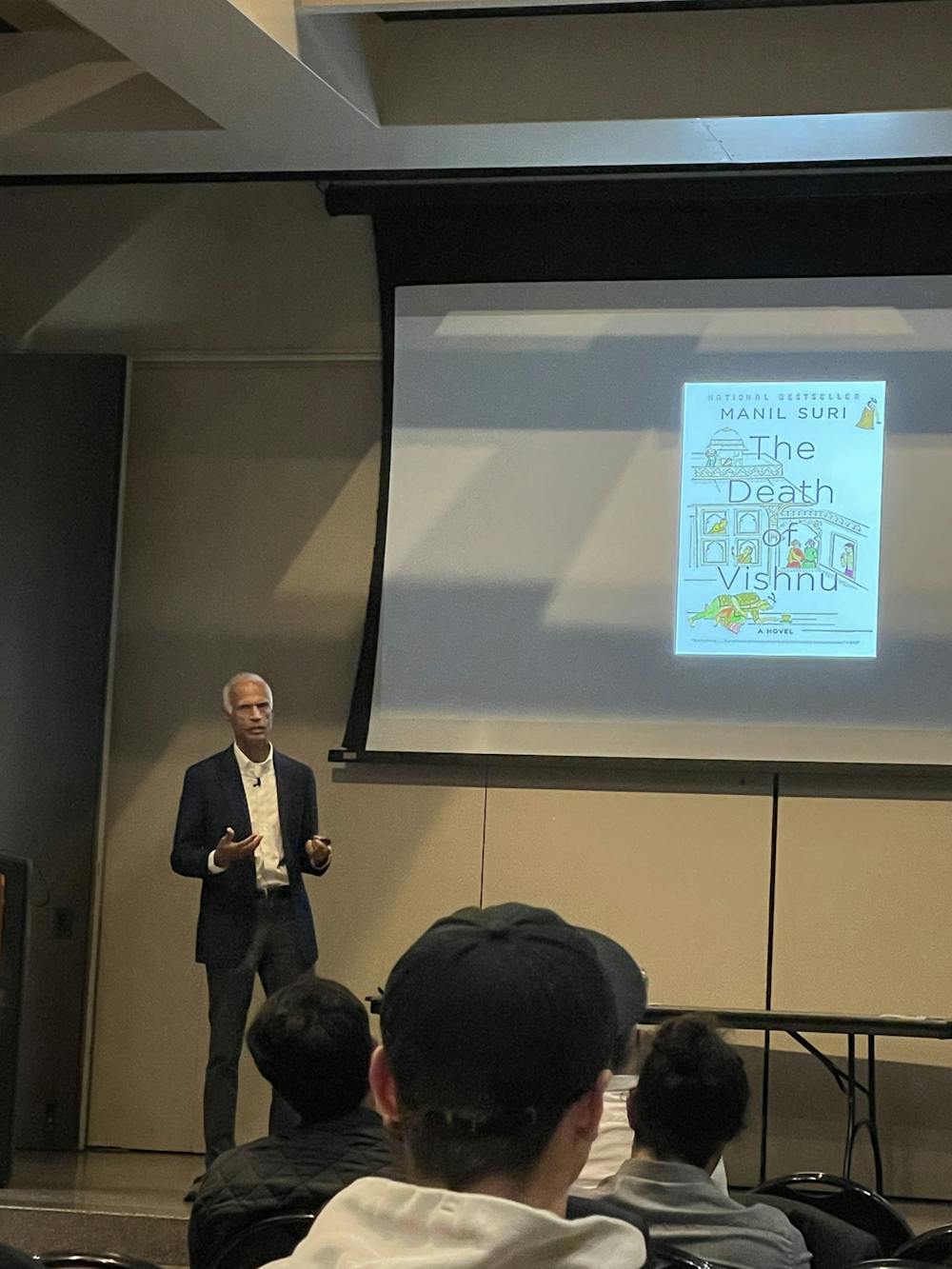Internationally-acclaimed author and mathematician Manil Suri spoke about math, fiction, sexuality and creation in front of a packed Glass Pavilion audience on Sept. 29 in celebration of his latest book, The Big Bang of Numbers: How to Build the Universe Using Only Math.
The event, co-sponsored by the Hopkins Undergraduate Society for Applied Mathematics (HUSAM), South Asian Students at Hopkins, Ex Numera, the Diverse Sexuality and Gender Alliance, the University Writing Program and the Whiting School of Engineering Center for Leadership Education, chiefly focused on Suri’s personal journey through the worlds of mathematics, creative writing and sexual orientation.
In an interview with The News-Letter, HUSAM Co-President Ashwin Pasupathy noted that this thematic diversity was vital in organizing the event.
“It was harder to get clubs to not join than it was to get them to join this event. Dr. Suri’s not just a mathematician, he’s also a novelist, he's also a member of the LGBTQ+ community, and it’s really important to understand that we're not just one thing. It's really great for all undergrad groups who share some of those identities to come and help us out,” Pasupathy said.
Suri noted, it’s possible to construct the universe from nothingness, a truth revealed to him in an undergraduate algebra class.
“I can show you how to build the integers as well out of nothing — starting with something called the empty set and identifying that with a number zero, much like, centuries ago, the Hindus actually looked at the void and got the number zero out of that. Once you have the number zero, you actually have something and can start generating all the whole numbers,” he said. “This is what religion claims to do creation ex nihilo, which means creation out of nothing.”
The premise that the entirety of the universe can be created from nothing solely using the rules of mathematics is the core idea of Suri’s book which begins from nothing and builds everything in a seven-day cycle of creation involving arithmetic, geometry and physics.
While Suri expounded on his book, he also focused on his personal journey of recognizing pieces of his identity often ignored in the mathematical world, most notably his sexuality, a process which began when Suri came from India to Carnegie Mellon University for graduate school.
“I was just beginning to discover that I might be gay and India at that time, was very repressed, so there was no real scope of exploring that,“ he said. “[Coming to the United States] was my ticket to actually do something that would help develop my own identity.”
He continued to discuss the reality that in many STEM fields, there is an expectation that work is the only topic worth discussing, sharing a story about a statistician who told him that having non-mathematical interests destroys a mathematician’s abilities.
“This idea prevails, especially in STEM subjects, that you only talk about work; you don't really bring up extraneous topics,“ he said. “ If you're gay, that’s not part of the norm and people in a large part of my career weren't really interested in it, so I never really brought that up and was basically very closeted because of it.”
This same culture of exclusivity caused Suri to hide his interest in creative writing from his peers, for example, telling them that he was working on a calculus textbook rather than his first novel, The Death of Vishnu.
His latest book aims to break this division, emphasizing that math is just as much a creative activity as writing or music.
“Being a novelist, I wanted to introduce some elements from that and so what I did was the numbers in this book are actual characters — they are not exactly alive, but I have a lot of fun with them,“ he said. “Mathematics is a game that you play; you have a set of rules and then you change them and see how far you can go. This playfulness is something that often gets lost in education, so that's what I wanted to introduce and play with.”
Associate Research Professor and HUSAM Faculty Advisor Donniell Fishkind, a former student of Suri’s at the University of Maryland, Baltimore County, discussed how he was inspired to pursue a PhD because of Suri.
“We all know there’s a hard upper bound on how interesting a mathematics professor can be, a very hard upper bound, or so I thought,“ he said. “Then eight years later, Professor Suri publishes a novel and suddenly is catapulted into this sphere is writing blockbuster, internationally acclaimed award-winning novels, and I did not see it coming. I sent him an email saying ‘You've inspired me again, and you've given me hope that one day, maybe I too can be cool.’“
Suri closed his talk by urging attendees to continue to explore their identities and their passions, rather than stifling them for the sake of others.
“There is going to be a lot of pressure once you enter the real world to say, ‘Okay, I'm not going to do this,’” he said. “But keep that alive somehow because, at some point, you're going to return to that… and that will give you so much freedom and the pure joy of doing it.”





